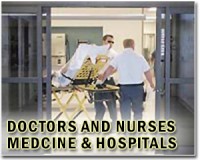 |
Washington (UPI) May 5, 2011 The U.S. Veterans Affairs Department hopes to transform veterans' healthcare by tying veterans' health issues to genomic research, an official said Thursday. The Million Veteran Program, expanded nationally Thursday, is "an important partnership between VA and veterans to learn more about how genes affect health, and thus, transform healthcare for veterans and for all Americans," health Undersecretary Robert Petzel said. "This innovative research program will support VA's mission to provide veterans and their families with the care they have earned," said veterans affairs Secretary Eric K. Shinseki, a retired U.S. Army four-star general. A genome is the entirety of a person's hereditary information, encoded in DNA or, for many types of viruses, in RNA. DNA, or deoxyribonucleic acid, contains the genetic instructions used in the development and functioning of virtually all known living organisms. RNA, or ribonucleic acid, is one of the three major macromolecules -- along with DNA and proteins -- required for all known forms of life. The VA program seeks to consolidate genetic, military exposure, health and lifestyle information together in a single database, the VA said in a statement. The database will be used by authorized VA, government and U.S. academic researchers "to conduct health and wellness studies to determine which genetic variations are associated with particular health issues," the VA statement said. By identifying gene-health connections, the program can advance disease screening, diagnosis and prognosis, so veterans receive "more effective, personalized therapies," the statement said. In letting researchers analyze and compare DNA and other genetic materials of as many as a million veterans, the program has the potential to be "a powerful tool in genetics research," the VA said.
Share This Article With Planet Earth
Related Links Hospital and Medical News at InternDaily.com
 Rare-disorder baby has 7-organ transplant
Rare-disorder baby has 7-organ transplantMiami (UPI) May 5, 2011 A 19-month-old San Antonio girl with an often-fatal disorder keeping her from eating is ready to go home after having a seven-organ transplant, a doctor said. Delilah Nevaeh Valdez "likes Chef Boyardee ravioli," University of Miami Jackson Memorial Hospital pediatric gastroenterologist Jennifer Garcia said at a news conference. "She's the perfect patient, any GI doctor's dream." ... read more |
|
| The content herein, unless otherwise known to be public domain, are Copyright 1995-2010 - SpaceDaily. AFP and UPI Wire Stories are copyright Agence France-Presse and United Press International. ESA Portal Reports are copyright European Space Agency. All NASA sourced material is public domain. Additional copyrights may apply in whole or part to other bona fide parties. Advertising does not imply endorsement,agreement or approval of any opinions, statements or information provided by SpaceDaily on any Web page published or hosted by SpaceDaily. Privacy Statement |